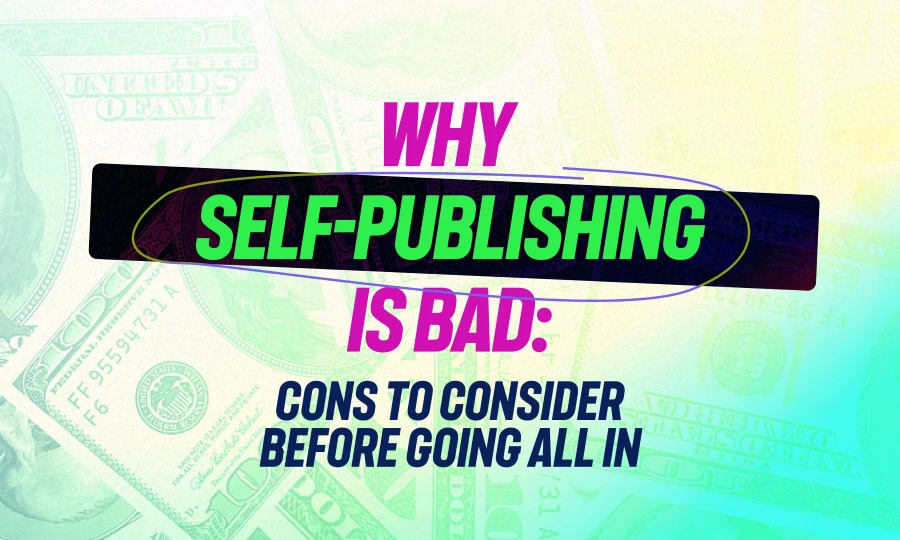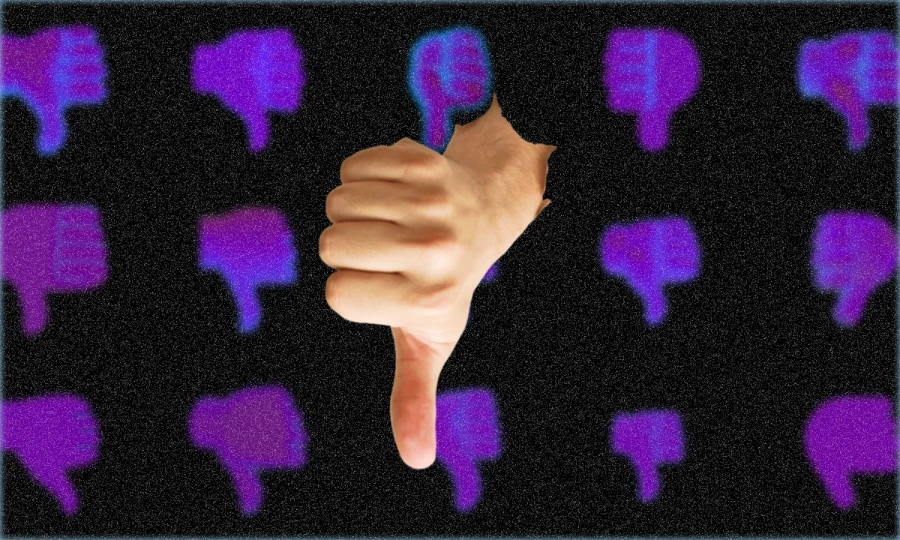
Keep the FREE Webinar by Christian...
The #1 Way To Profit from Audible By Amazon
Yes, I Want to Create A Side Hustle Using A.I.
 Entrepreneurial Lifestyle
Entrepreneurial Lifestyle Why Self-Publishing is Bad: Cons to Consider Before Going All In
Why Self-Publishing is Bad: Cons to Consider Before Going All InSelf-publishing. The good, the bad, and the ugly.

Clearly, we're hashtag Team Self Pub here, and we've seen self-publishing change thousands of lives, but it isn't for everyone. Sure, you get to maintain control over your work and potentially earn way more money than you would through traditional publishing. But there's no such thing as a magic button you can hit to get a perfectly edited and formatted manuscript to share with the world (at least...not yet. We are working on it, though).
The biggest challenge for solo publishers can be a lack of support and resources that a traditional publisher may offer upfront. Taking ownership over the entire process means just that. Having to make the big decisions every step of the way, from the ideas to the distribution of your published books. Being responsible for all these tasks on your own can be overwhelming and time-consuming if you don't have a proven process and systems to follow.
Ultimately, this blog post will go over why self-publishing is bad so you can decide for yourself whether this is a path that you'd like to pursue.
You're in luck. Our free AI webinar lays down the foundation for starting your publishing journey, so you don't have to. You'll be introduced to some of the most successful self-publishers in our community and get the exact playbook they all use to make money online from anywhere in the world.
Anyone embarking on a new business venture wants to know...
A) it will be profitable
B) how long it will take to be profitable
The true costs of self-publishing will vary based on your publishing and business goals, but we all have two resources to spend with: time and money. If you're short on time but have some extra cash stashed away, you can outsource a lot of the process. If you're short on funds, on the other hand, your only option is to do all the leg work yourself as you work your way up to hiring other writers and editors to help.
Let's take a look at what costs you might incur as you publish your book.
Whether you're writing short stories or literary fiction, most self-published books are going to incur costs associated with these basic steps in the publishing process:
You will also need to budget for resources such as ISBN numbers, printing costs, and distribution fees, depending on which platform you decide to publish your work on. These expenses can add up quickly, and it can be difficult to recoup your investment if your book doesn't sell well.
We recommend Amazon Kindle Direct Publishing (KDP) to minimize expenses. The cost to publish on Amazon KDP is nothing. Yes, you can publish an ebook with no initial investment. With KDP, your book is printed on demand or downloaded as an ebook, which means you don't have to pay for printing upfront.
Be honest with yourself!
Do you have more time or money to invest in your business right now? There's no right or wrong way to go about indie publishing, but setting realistic goals can prevent a lot of heartache and expenses down the line.
Juggling the expenses with royalties and profits can be a bit intimidating when you're new to the process, but the math is simple. Most self-publishing platforms offer royalties of around 70% of your book sales, which is calculated after deducting the costs of printing and distribution. As a result, your actual profits may be much lower than you anticipated. We offer a KDP royalty calculator tool to help you estimate your numbers ahead of time.
A 30% cut might seem steep, but you would pay a traditional publisher even more while also having to keep track of inventory management, so the tradeoffs for publishing on Amazon are typically more than worth it for indie authors and publishers.
A good book publishing program or book publishing coach may help teach you how to find the most profitable niches ahead of time so you don't waste weeks writing and publishing a book that isn't likely to have a decent readership.
When you self-publish, you will not receive an advance on any of your books. Advances are payments that traditional publishers give to authors upfront, and they are typically based on the expected sales of the book. While advances can be a significant financial boost for authors, they also come with strings attached. You are giving up part of your creative rights and freedoms in exchange for this money, and if the publisher suddenly drops you, you're left to fend on your own.
Once you have a self-published book, on the other hand, you have experience and knowledge about the publishing process that no one can take away from you. These skills can then be applied to future books as you build out your business.

When it comes down to assessing the quality of a manuscript for publishing, everything matters. And we mean everything. The table of contents, the images, the font choice, and even the spacing of your text can have a big impact on the readers.
It's easy for most beginner self-publishers to miss something in their own book and their own writing that they would have perhaps noticed in someone else's. In fact, it's normal. But this can also get in the way of profits.
Here are some other challenges you may encounter while working on your own book:
Without professional editing, your book may contain grammatical errors, typos, and other mistakes that can detract from the reading experience. A good professional editor does a lot more than just dot the i’s and cross the t’s. They also look at the order of the content and what might be missing from the reader's point of view.
The truth is that a vast majority of authors and publishers who skip out on working with a good editor come to regret it.
Professional editing is a spectrum. You can find freelancers at the lower end who offer their services through platforms like Upwork and Fiverr. Or you can work with professional agencies who might cost you more but bring more experience to the table. You may also consider hiring one-time beta readers or critique partners to help you catch any issues before publication.
Note: A good DIY tool for checking for grammatical and spelling errors is Grammarly. The AI tool will even give you suggestions to help rewrite sentences for clarity.
Poorly designed book covers can turn off potential readers before they even give your book a chance, while poorly formatted interiors can make the reading experience frustrating. Although there are tons of helpful YouTube videos and courses out there, if you're not trained in graphic design, it's best to get outside help while you gain more experience.
Hiring a professional designer can help ensure that your book's design is up to industry standards, and over time, you'll have more data about what works and what doesn't. Most authors and publishers these days partner with a designer for their first novel and subsequent novels because an outside perspective can make the difference between your book ending up in people's shopping carts or completely getting overlooked.
Note: If you're stuck DIYing everything, some helpful graphic design concepts to study are color theory, color psychology, and the rule of thirds.

As an indie publisher, you'll also be responsible for promoting your book and reaching your target audience. This can be a daunting task, especially if you do not have a strong platform or social media presence with engaged followers.
If you're starting with zero platform whatsoever, it's still possible to become a successful publisher, but the old adage is true: It typically takes us one thousand hours of practicing a skill before we truly master it. And trial and error can get pretty expensive in the marketing and advertising world...
Let's take a closer look at what it takes to grow your audience as a self-publisher:
Promotion is key to getting your book noticed, but it can be difficult to stand out in a crowded market. You will need to create a marketing plan that includes advertising, social media promotion, and, if you're feeling up for it, book signings or speaking gigs.
Customer research can take hours, but it's a necessity to get your ads in front of the right people and sell books to relevant audiences. If a person exclusively reads fantasy novels, they may not be interested in a book about becoming a realtor, and the sad truth is that marketing to the wrong audience is almost worse than not marketing your book at all.
Ready to discover what actually works? Join our exclusive webinar backed by the success of thousands of students all over the world who are making money online with the help of AI.
Another challenge is distribution. Traditional publishers have established relationships with bookstores and other distribution channels, making it easier for their books to reach a wider audience. As a self-published author, you will need to find ways to get your book into bookstores and other retail outlets.
One solution is utilizing print-on-demand services like Amazon's Kindle Direct Publishing or IngramSpark. These services allow you to print physical copies of your book as they are ordered, eliminating the need for large print runs and storage.
Put it this way. Would you rather focus on writing or have the headache of keeping track of physical inventory on top of missing or stolen packages and refunds like a traditional business model? To most people (at least the ones who want to make a profit), it's a no-brainer.
Embarking on this path takes a certain level of motivation and follow-through that even the best writers might struggle with from time to time. Here are some things to keep in mind:
One of the biggest differences between traditional publishing and self-publishing is the role of agents and publishers. In traditional publishing, agents act as gatekeepers, deciding which manuscripts are worth submitting to publishers. Publishers then decide which books to publish and provide editing, marketing, and distribution services.
While having a literary agent and publisher can provide valuable support and resources, it also means giving up a portion of your publication rights and creative control. Additionally, agents and publishers may have different opinions on your book's content or marketing strategy, leading to disagreements and potential changes to your work.
When you work for yourself, you never have to answer to a boss or schedule a meeting with a coworker you don't particularly like...ever again.
Some self-published authors may feel like they don't have anyone else to talk to in this space about the things they are going through, but the publishing world is growing by the day. If you decide to join a book coaching program or a self-publishing course like ours, you get instant access to a private community of thousands of others on the same journey to swap tips and encouragement.
It's impossible not to be inspired when you're seeing dozens of posts like this on the daily:

Taylor Swift was right: Haters gonna hate. Self-publishing has become a lot more common in recent years, but there are still people out there who will pass judgment no matter what.
It's not fun talking about, but here's how to protect your reputation in the industry:
One of the biggest drawbacks of self-publishing is that it can be difficult to gain the respect of literary critics, book reviewers, and even readers. Some people still view self-publishing as a sign of an author's inability to secure a traditional publishing deal, but this is quickly changing.
Hugh Howey is one of the most famous authors in the world, and he has built his seven-figure career entirely as a self-publisher. By focusing on the things you can control, you can build a strong reputation as a publisher.
In our private Facebook community, we celebrate negative reviews. That might sound a little backward, and we definitely don't encourage seeking them out, but one bad review happens to everyone. Sometimes, a bad review holds constructive criticism you can use to make your books even better, and sometimes a bad review is best left alone.
Your career trajectory or your success as a publisher and author isn't determined by the opinion of a stranger on the other side of the Internet...unless you let it be.
Vanity presses are companies that charge authors to publish their books, often with the promise of increased exposure and success. However, many of these companies do not provide quality editing, design, or marketing services, leaving authors with poorly produced books that do not sell. Some of these companies also require a hefty upfront investment, which might not always pan out in your favor.
Do your research! Any publishing company that makes claims that are too good to be true without the reviews to back them up is a giant red flag.
Note: Now that AI is all the rage these days, it's also worth mentioning that these reviews should be written by actual human beings on a website like Trustpilot that takes the time to validate and authenticate them.
If you want to know why self-publishing is bad, our webinar won't be able to help you with that. Besides, there’s enough negativity out there on the Internet and the news to last a century.
But here's what it CAN help with:
✅ Knowing exactly how to start publishing books and making money online.
✅ Proving that work/life balance isn't a myth.
✅ Hitting the reset button on what you thought was possible with making a passive income.
Not entirely convinced that this can work for you? Browse our Student Success Hub, and you'll see that anyone can do this. Retired teachers, farmers, dating coaches, college students, parents, uncles, and scuba divers have all taken the leap and never regretted it for an instant.


